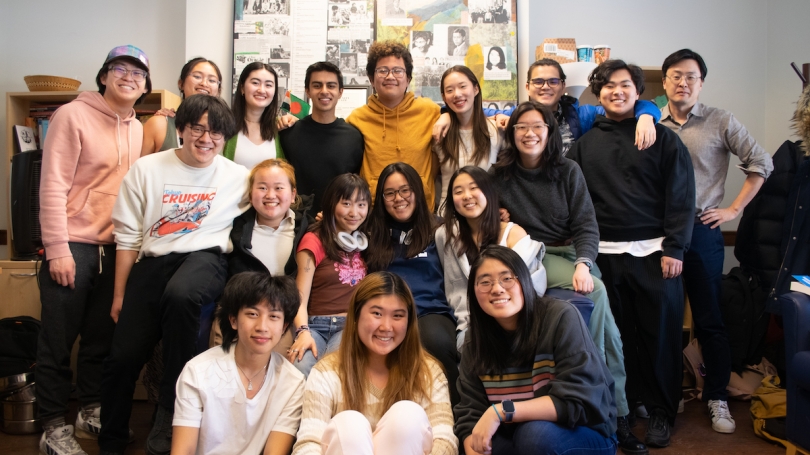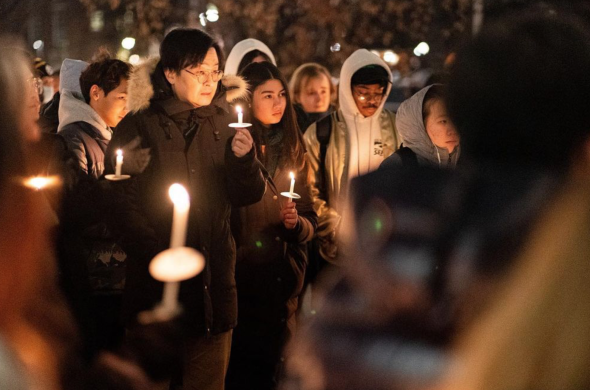

A course taught by sociologist Sunmin Kim empowered students to reconstruct and share the history of Asian American student activism at Dartmouth.
During his junior year, Daniel Lin '23 began researching the history of Asian American student activism at Dartmouth.
A member of the Dartmouth Asian American Studies Collective, Lin had begun considering what would happen to the group after he and student leaders Lily Ren '23 and Maanasi Shyno '23 graduated.
"I was thinking about how organizations pass on intergenerational knowledge," Lin says. "When we first started DAASC, we knew that we weren't the first students to organize for this initiative, but we didn't know exactly what the history was. I started asking myself, 'What did students do before us? How did they organize? What strategies did they use?'"
Lin began searching the Rauner Special Collections Library for information about past Asian American student activism. By the fall of 2022, his project had evolved into an independent study under the guidance of Assistant Professor of Sociology Sunmin Kim, whose research focuses on race and immigration in the United States.
"Once we started, we found that the scope of this research project was bigger than what we imagined," Kim says. "We instantly felt that this was beyond ourselves and began thinking about ways to scale it up."
With approval from Department of Sociology chair Marc Dixon and funding support from the Office of the Dean of Faculty, Kim created a special iteration of the winter 2022 sociology course Race, Power, and Politics. It focused on Asian American student activism at Dartmouth and brought together 16 students—many of them members of DAASC—to continue and expand Lin's research.
This past winter's Race, Power, and Politics culminated in a virtual exhibit, Asian American Student Activism at Dartmouth College, that was unveiled during a public presentation on April 20. The multimedia project can be found among Dartmouth Library's collection of student course exhibits.
"This innovative course enhances ongoing efforts to establish a robust curriculum in Asian American studies at Dartmouth," says Associate Dean of International and Interdisciplinary Studies Matthew Delmont. "It is great to see the amazing work that the students and Professor Kim did in the course."
"Students stay at Dartmouth for only four years, so movements that are really popular can die down in a matter of years," Kim says. "In order to avoid that fate, it's vital to understand and pass down the history between generations of students. I thought that this would be a great way to lay out infrastructure that students can use to sustain the community and their activism."
Reconstructing the history
Before students began their research, Kim led classroom sessions on Asian American history and arranged learning sessions with staff from Rauner Library.
Students in the course identified four key areas of Asian American student activism upon which to focus their research: community building, anti-Asian hate, artistic expression, and institutional responses. The class split into four groups, with each group assigned one of the research topics.
For the next several weeks, students combed through an extensive collection of archival materials.
"It was a constant process of discovery for us—there were so many documents to look through, from past email exchanges and pictures to meeting notes, petitions, letters to the administration, written proposals, and more," says Jessica Yang '25.
After collecting some initial material, the students began contacting some of the alumni and former faculty mentioned in the documentation. The resulting oral history interviews helped students fill in the gaps in the archival record and gain first-hand perspectives on past events, groups, and mobilizations.
"We reached out to alumni to ask them to elaborate on the experiences that led to the generation of the archival material we were witnessing," Kim says. "Putting together the interviews and the archival material, we were able to reconstruct the history."
"Once we had collected all this material and alumni perspectives, we had to organize it, edit it down, and try to convey a streamlined message," says Lauren Lim '26.
One trend that students discovered and highlighted, for example, was Asian clubs and organizations being created, dissolving after a few years, and then being recreated. The exhibit includes a non-exhaustive list of Asian clubs and organizations.
"Our hope is that the information presented in this exhibit would make it easier for current and future students to replicate the organizations, possibly with the assistance of alumni who undertook similar endeavors in their time at the College," the exhibit reads.

Due to the large volume of documentation, the editing process was challenging.
"As a class, the hardest part was deciding what story we wanted to tell and how we wanted to go about crafting a clear narrative out of the archival materials we found," Yang says.
Students also engaged with Asian American studies scholars from across the country by attending the Association for Asian American Studies Annual Conference in Long Beach, Calif. Students attended sessions and presented their research in a joint panel with students from the University of Minnesota and Wesleyan University. They also met Asian American studies scholar and University of California, Riverside professor Jodi Kim, who will join Dartmouth's English department this fall.
"Through that panel and the conference itself, we were able to connect with students from around the country who were all fighting for Asian American studies, and start conversations on how to create a lasting support network to collectivize around our common goal," Yang says.
'A guiding light for what is possible'
"While our work was often mentally and emotionally taxing, it was the joy of being in community together, our shared enthusiasm and passion, that pushed us to continue," Yang says. "This is so much more than just a class—it's become a strong community, a beacon of hope, and a guiding light for what is possible."
The project helped many students better understand their identities as members of the greater Asian American community.
"Even though I have always identified as 'Asian American,' I was very unsure of what that really meant," Lim says. "This project was meaningful in the way that I felt truly connected to this bigger idea of 'Asian Americans,' even in the microcosm of Dartmouth College. To discover that Asian American students 20 years ago had felt similar patterns of what it means to be Asian American is a truly special level of understanding."
Yang also noted the project's personal impact.
"This class has been an incredibly transformative experience for me," she says. "Growing up in a predominantly white suburb in Texas, I never had the opportunity to think deeply about my own identity or learn about the history of my own community. For so long, I felt invisible and ashamed of my own identity that I tried so hard to deny. This project has been a space for healing, a safe space where, for the first time, I felt truly seen and understood."
For Kim, the course was an opportunity to renew his passion for teaching.
"It was a really empowering experience," Kim says. "I embarked on this project thinking that this is a service to the students and to the College, but I think I was serviced by this endeavor because I found myself more invested in the College and in my job."
"I met these students when many of them were freshmen, and I could witness their real-time racial awakening and how they became more intellectually mature and involved in academics," Kim says. "That was probably the most rewarding thing I have done as an instructor."
Through the exhibition, the students hope to provide historical context that will enable the next generation of student organizers to build on more than three decades of activism.
"In my own reading of the history, I would characterize the history of Asian American activism as cycles of mobilization and indifference, of frustration and disappointment," Kim says. "My hope is that we can present this history to the present and future generations of students so that they don't repeat the same cycle and so that things finally change during their time at the College."
"Professor Kim offered an enlightening perspective to help us reframe our thinking," Yang says. "While it's true that this work is cyclical, isn't it beautiful that time and time again, generation after generation, students have continued to find each other and carry on?"
View the virtual exhibit, Asian American Student Activism at Dartmouth College.